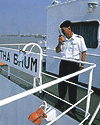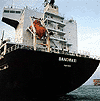 |
|
As should be expected at any international airport, incoming foreign and domestic airplanes alike should enter only with permission and guidance from air traffic control, who strictly navigate the plane to its proper landing spot. Similar procedures are applied to oceangoing vessels entering the Kingdom of Thailand, who would be at the mercy of maneuvering their gargantuan masses through waters and weather they may never have encountered,
were it not for compulsory piloting. Compulsory piloting is a vessel valet service, employing Thailand's Port Authority's total of 77 pilots to steer the yearly 20,000 trips into and out of any one of Thailand's six ports by the vessels transporting goods here. That is, vessels entering and leaving Thailand must be steered by any one of these highly experienced local pilots, to minimize the possibility of a foreign vessel sinking in the narrow (roughly 170 meters in width)
Chao Phraya Channel or causing any other disruption to the billions of baht movement of goods of international trade that is dependent on these vessels. |
|
 |
|
In this edition, Sarakadee was privileged enough to follow the steering of the SETTSU vessel, owned by a Hong Kong national and registered in Panama, 159.53 meters long and 25 meters wide, weighing 13,448 tons and transporting containers full of goods from a port in Vietnam. From the time of initial contact made by the local Thai pilot with the crew and captain on board, who in any major emergency within Thailand's waters has ultimate
authority and responsibility over the vessel, the vessel's navigation through the Chao Phraya Channel, and the pilot's final departure from the vessel at the pilot station, Sarakadee was able to witness firsthand not only the interesting jargon and behavior that distinguishes vessel navigation, but again, the immensity and necessity of facilitating the movement of cargo and ensuring the flow of traffic. |
|
